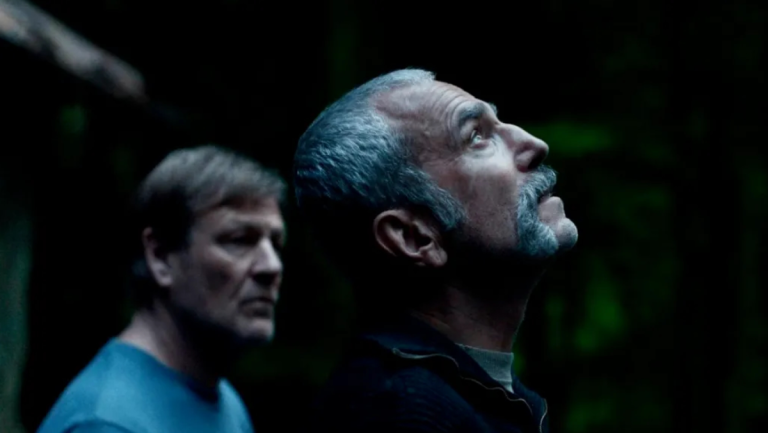The complex bond between attachment and release is deeply intertwined with love and mortality. In our lives, we tend to pose a significant question to our partners about the aftermath of one’s death, or rather, who dies first. The responses are typically complex, simplistic, or non-existent. Yet, the familiar pattern of shuttling between home and hospital, clinging to a sliver of hope, has become an undeniable reality. It’s as tangible as the clash between eternal love and the harsh truths of existence. Gajendra Ahire, a more pronounced name in the Marathi film industry, tries to tackle this dilemma in “The Signature,” which, of course, is not for the first time. Yet, the perspective that it chooses is complicated and sensitive- that of an old man with a much more energetic wife who finds herself unexpectedly on the verge of death.
The middle-aged, retired librarian Arvind is living a happy life, the kind that most middle-class Indian men his age would aspire for. The love he shares with his wife, Madhu, is affectionate in an almost motherly sort of way. His wife takes care of his paperwork, life insurance policies, paperwork, and everything else. At one point, it feels like it is less about love and more about his dependency. The children are in the frame- a mediocre son and a daughter married into a well-off household. But they appear as mere footnotes, making the journey look like it is set in the regular, real world. The ingredients of the story are just as familiar.
The film opens on such an old-school and happy note that you almost know that someone or the other will die or get hospitalized the very next instant, which happens soon. Madhu falls unconscious at the airport, cutting short a Europe trip that had not even begun. Then starts Arvind’s relentless back-and-forth from his humble village home to the metropolis hospital as he holds on to his steadfast belief that Madhu needs to live more.

The concept is innovative and perfect for thoughtful exploration. The narrative lays its cards clearly, featuring an ever-driven old friend and a childhood love returning with a terminal illness yet leading a solitary, affluent life. However, the execution lacks a humanistic touch, if any. Instead, Ahire focuses too much on extracting poetry from the circumstances.
The film ultimately relies on a series of rhymes and philosophies articulated incoherently by the protagonist, which comes across as rigid and out-of-place, rendering them meaningless. To rationalize the ‘kavita’ involved, an entire subplot emerges in the latter half, detailing how Madhu, a poetess, aspired to publish her diary of poems as a book. However, one might question if any publisher would invest in such a lack of originality in the text.
In fact, the film’s selling point is actually its weakest link. Amongst everyone else in the movie is Anupam Kher, who delivers the worst performance. The actor’s portrayal of a man worn down by age and grief is hardly believable. The writing cannot establish the stubbornness and generational distance that his character embodies. The flicker of innocence that returns to him when he meets his childhood sweetheart Ambu is never felt, something that Kher is otherwise good at evoking. The acting is so bad that even an extended cameo by Ranvir Shorey fails to rescue the ensemble’s failings.
In fact, Mahima Chaudhury’s laboured portrayal of Ambu, who has a terminal illness and strives to find happiness in isolation, becomes the film’s only breath of life. Yes, the acting hardly helps, but at least it is a fully formed story in a movie that looks and feels like a sea of campy and sketchy afterthoughts.
Indeed, technical aspects are often secondary when the narrative seems only loosely connected to a merely panning camera. However, lighting and editing are traditionally recognized for imbuing a film with a sense of intent. However, the oversimplification, particularly the abrupt editing in the third act, gives off the pungent stench of substandard and underpaid work. Sometimes, the film’s attempt to deliver successive shock values becomes unintentionally humorous. The music, aspiring to echo classical traditions, also falls short of realizing its potential.
Most of all, the twisted climax is unintentionally funny. It is meant to round off the “existential tear-jerker” that the film is supposed to be, but it resembles an unformed black comedy. But, perhaps, it is also the perfect way to rationalize one of the worst takes on the relationship between love and mortality in recent times. Rarely does a deeply personal and lifelike abstraction feel so easily irritable.




![Reflection [2021]: ‘Venice’ Review – A Beautifully Shot Microcosmic Tale on Trauma & Violence](https://79468c92.delivery.rocketcdn.me/wp-content/uploads/2021/09/Reflection-2021-768x320.jpg)
![The Dead Don’t Die [2019]: ‘Cannes’ Review – A peculiarly disappointing attempt at deadpan](https://79468c92.delivery.rocketcdn.me/wp-content/uploads/2019/05/The-Dead-Dont-Die-Review-01-768x404.jpg)

![It Comes at Night [2017]: Despairing Vision of Fear and Paranoia](https://79468c92.delivery.rocketcdn.me/wp-content/uploads/2017/09/ICAN-cover-768x263.jpg)
